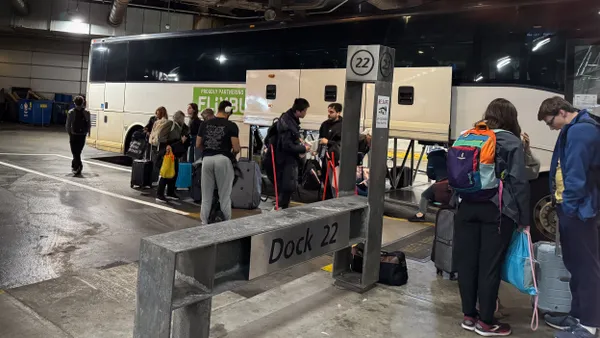Dive Brief:
- Mobility solutions provider and consulting company Lacuna has launched to help cities successfully adopt open-source software that manages transportation and mobility services.
- Lacuna will use open-source platforms — such as the Mobility Data Specification (MDS) that the Los Angeles Department of Transportation (LADOT) launched last year to analyze data from mobility-as-a-service (MaaS) companies — to assist cities with their policies and infrastructure plans regarding traditional and new transportation modes like ride-hailing and scooter-sharing.
- Cities are starting to recognize that in the digital age, they need different tools to manage new mobility devices and services that already are in public rights of way, Lacuna CEO Hugh Martin told Smart Cities Dive. "There can be a big leap from a set of codes or software that you get from an open-source foundation and then having something... that runs 24/7 that has all the bug fixes and is talking actively to scooters and ride shares and drones and package delivery trucks all at the same time," he said. "Taking that open-source software and turning it into a real product is challenging, and that transformation is what Lacuna is focused on."
Dive Insight:
Using open-source mobility management software — meaning anyone can access, use and contribute to it without a licensing fee — is a cost-effective way for cities to share and build on current best practices for modern transportation.
This summer, a coalition of cities created the Open Mobility Foundation (OMF) to build and govern open-source technology tools that improve how cities manage modern transportation infrastructure. That group governs the MDS.
MDS and similar open-source software is catching on and soon "there will be massive adoption and all the cities will be running the same kind of software," Martin said. Some cities prefer to bring in a third party to oversee the constant management and updates necessary for such a complex digital environment that incorporates data from many sources.
In addition, a third-party consultant such as Lacuna can get a city up to speed on mobility issues, trends and opportunities and help to configure a digital management system so it represents an individual city's policies, Martin said.
Adopting an open-source mobility management system helps cities transition from traditional transportation planning and infrastructure implementation to a more rapid and efficient response in the digital era. For example, traditional transportation planning methods might involve placing pneumatic tubes or other devices across roadways to get traffic counts or track vehicle speeds. The months of surveys and analyses could end with a decision for a traffic calming measure that gets implemented a year or more after the project began.
But the real-time traffic data available through navigation apps such as Google Maps or Waze is far faster and more dynamic. They frequently re-route drivers to more favorable streets so "it doesn't make sense to put out rubber strips and go through all this planning because in a second it's going to be a different traffic scenario," Martin said.
Instead, transportation management platforms could allow planners to implement a calming measure such as only allowing Waze to route a set number of cars down certain streets each day. "That's an operational, real-time idea where policy can now be used to improve the quality of life for citizens on that street," Martin said.
Lacuna also sees drone policy as a hot area that could benefit from greater data collection via open-source management systems and from oversight by the OMF. The business anticipates helping cities in that arena as it matures and becomes more regulated.
Open-source transportation management systems are still an emerging field and adoption has not yet become mainstream. Likewise, "there's really not a lot of competition in the space" of service providers who perform what Martin calls these "operational functions."












